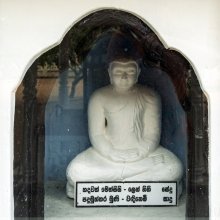Padumuttara: 2 definitions
Introduction:
Padumuttara means something in Buddhism, Pali, Hinduism, Sanskrit. If you want to know the exact meaning, history, etymology or English translation of this term then check out the descriptions on this page. Add your comment or reference to a book if you want to contribute to this summary article.
Images (photo gallery)
In Buddhism
Theravada (major branch of Buddhism)
Source: Pali Kanon: Pali Proper Names1. Padumuttara
The tenth of the twenty four Buddhas. He was born in Hamsavati, of the khattiya Ananda and his wife Sujata. At the moments of his birth and his Enlightenment, a shower of lotuses fell in the ten thousand worlds, hence his name. He lived as a householder for ten thousand years in three palaces: Naravahana, Yassa (or Yasavati) and Vasavatti. His wife was Vasudatta, by whom he had a son, Uttara (according to SNA.i.341, his son was Uparevata). He left home in his palace (Vasavatti), and practised austerities only for seven days. A maiden of Ujjeni, called Rucinanda, gave him milk rice, and the Ajivaka Sumitta gave him grass for his seat. His bodhi tree was a salala, under which he spent a week, and when he touched the ground with his foot, huge lotus flowers sprang out of the earth, covering his body completely with their pollen. (The Samyuttabhanakas give this as the reason for his name.) His first sermon was preached to his cousins Devala and Sujata, who later became his chief disciples. The spot where the sermon was preached was Mithiluyyana. Sumana was Padumuttaras personal attendant, Amita and Asama his chief women disciples, Vitinna and Tissa his chief patrons among men, and Hattha and Vicitta among women. His body was fifty eight cubits high, and his aura spread for twelve yojanas. He died in Nandarama at the age of one hundred thousand, and a thupa twelve leagues in height was erected over his relics. In his time, the Bodhisatta was governor of a province (ratthika) called Jatika (Jatila). Bu.xi.1ff.; BuA.157ff.; J.i.37, 44; DhA.i.99, 417; iii.146, etc.; also Ap.i.57, 63, 101, 107; Mtu.ii.58.
It is said (E.g., MT.59) that in the time of Padumuttara there did not exist a single heretic.
Many of the eminent disciples of Gotama Buddha are said to have first conceived their desire for their respective positions in the time of Padumuttara Buddha, after seeing similar rank conferred on Padumuttaras various disciples in acknowledgment of their special attainments - e.g.,
Annakondanna, Maha Kassapa, Anuruddha, Bhaddiya, Pindola Bharadvaja, Punna Mantaniputta, Maha Kaccana, Culla Panthaka, Subhuti, Khadiravaniya Revata, Kankha Revata, Sona Kolivisa, Sona Kutikanna, Sivali, Vakkali, Rahula, Ratthapala, Kundadhana, Vangisa, Upasena, Vangantaputta, Dabba Mallaputta, Pilinda Vaccha, Bahiya Daruciriya, Kumara Kassapa, Maha Kotthita, Ananda, Uruvela Kassapa, Kaludayi, Sobhita, Upali, Nanda, Maha Kappina, Sagata, Radha, Mogharaja, Vappa, Upavana, Mahapajapati, Gotami, Khema, Uppalavanna, Patacara, Dhammadinna, Sundari Nanda, Sona, Sakula, Bhadda Kundalakesa, Bhadda Kapilani, Bhadda Kaccana,Theravāda is a major branch of Buddhism having the the Pali canon (tipitaka) as their canonical literature, which includes the vinaya-pitaka (monastic rules), the sutta-pitaka (Buddhist sermons) and the abhidhamma-pitaka (philosophy and psychology).
Languages of India and abroad
Sanskrit dictionary
Source: Cologne Digital Sanskrit Dictionaries: Edgerton Buddhist Hybrid Sanskrit DictionaryPadumuttara (पदुमुत्तर) or Padumottara.—see Padmottara.
Sanskrit, also spelled संस्कृतम् (saṃskṛtam), is an ancient language of India commonly seen as the grandmother of the Indo-European language family (even English!). Closely allied with Prakrit and Pali, Sanskrit is more exhaustive in both grammar and terms and has the most extensive collection of literature in the world, greatly surpassing its sister-languages Greek and Latin.
See also (Relevant definitions)
Starts with: Padumuttara Buddha.
Full-text (+148): Padumottara, Hamsarama, Vitinna, Vasudatta, Vicitta, Mithiluyyana, Naravahana, Sovannakattarika, Suvaccha, Rucinanda, Patihirasannaka, Pattipupphiya, Padumuttara Buddha, Sihaghosa, Ti Ukkadhariya, Saparivarasana, Atthasandassaka, Kumudadayaka, Jambuphaliya, Gandhapujaka.
Relevant text
Search found 10 books and stories containing Padumuttara; (plurals include: Padumuttaras). You can also click to the full overview containing English textual excerpts. Below are direct links for the most relevant articles:
Apadana commentary (Atthakatha) (by U Lu Pe Win)
Commentary on the Biography of the thera Upasena, the son of Vaṅganta < [Chapter 2 - Sīhāsaniyavagga (lion-throne section)]
Commentary on Biography of the thera Bhaddiya, son of Kāḷigodhā (Kāḷigodhāputtabhaddiya) < [Chapter 5 - Upālivagga (section on Upāli)]
Commentary on Biography of the thera Vidhūpanadāyaka < [Chapter 6 - Bījanivagga (section on Bījani)]
The Great Chronicle of Buddhas (by Ven. Mingun Sayadaw)
Buddha Chronicle 10: Padumuttara Buddhavaṃsa < [Chapter 9 - The chronicle of twenty-four Buddhas]
Biography (8) Sakulā Therī < [Chapter 44 - Life Histories of Bhikkhunī Arahats]
Biography (13) Siṅgalakamātu Therī < [Chapter 44 - Life Histories of Bhikkhunī Arahats]
The Jataka tales [English], Volume 1-6 (by Robert Chalmers)
Jataka 100: Asātarūpa-jātaka < [Book I - Ekanipāta]
Jataka 12: Nigrodhamiga-jātaka < [Book I - Ekanipāta]
Dhammapada (Illustrated) (by Ven. Weagoda Sarada Maha Thero)
Verse 307 - The Story of Those Who Suffered for Their Evil Deeds < [Chapter 22 - Niraya Vagga (Hell)]
Verse 392 - The Story of Venerable Sāriputta < [Chapter 26 - Brāhmaṇa Vagga (The Brāhmaṇa)]
Verse 160 - The Story of the Mother of Kumārakassapa < [Chapter 12 - Atta Vagga (Self)]
The Book of Protection (by Piyadassi Thera)
Discourse 16 - The Discourse At Isigili < [Discourses]
A Discourse on Paticcasamuppada (by Venerable Mahasi Sayadaw)
Chapter 3 - Summary < [Part 4]
